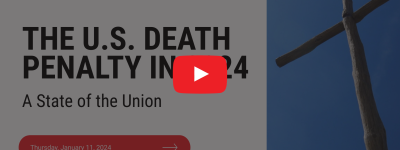
On May 9, 2024, Pope Francis announced the Jubilee Year 2025 in a ceremony at St. Peter’s Basilica. The theme for this Jubilee year: Pilgrims of Hope.
Pope Francis announced the 2025 Jubilee Year in a document, called a "Bull of Indiction," titled “Spes Non Confudit.” This title translates in English to: “Hope Does Not Disappoint.”
What is a Jubilee Year?
Every 25 years, the Catholic Church recognizes a year of pilgrimage, special grace, and reconciliation. These Jubilee years each take on a particular theme, but are often rooted in forgiveness. Traditionally, these years include gestures of amnesty or pardons.
The Jubilee Year 2025 will open at the Vatican on December 24, 2024 and close January 6, 2026 — the feast of Epiphany.
Ending the Death Penalty: An expression of hope
In the invitation to this Jubilee Year, Pope Francis has called on Catholics to strengthen their own sense of hope, but also to "be tangible signs of hope for those of our brothers and sisters who experience hardships of any kind."
As a tangible expression of that hope, Pope Francis called on all Catholics, but especially bishops, to "be one in demanding dignified conditions for those in prison, respect for their human rights and above all the abolition of the death penalty, a provision at odds with Christian faith and one that eliminates all hope of forgiveness and rehabilitation."
This direct call for the abolition of the death penalty in the context of the Jubilee Year demonstrates a powerful commitment from the Catholic Church to the work of ending capital punishment.
The Holy Father listed people in prison as the first category of those in need of hope. He plans to open a Holy Door in a prison “as a sign inviting prisoners to look to the future with hope and a renewed sense of confidence.”
Note: Opening “Holy Doors” at various pilgrimage locations throughout the world is a special tradition of Jubilees.
Pope Francis has also proposed that governments around the world consider jubilee “forms of amnesty or pardon meant to help individuals regain confidence in themselves and in society; and programs of reintegration in the community.”
Pope Francis’ Witness to Death Penalty Abolition
Pope Francis has long been a pastoral leader in the Church’s commitment to upholding the dignity of life through the abolition of the death penalty.
In 2018, Pope Francis and the Congregation for the Doctrine of the Faith solidified the Church’s teaching through a historic Catechism revision, officially stating that “the death penalty is inadmissible because it is an attack on the inviolability and dignity of the person (CCC 2267).” Additionally, the revision included a call for the Church to “wor[k] with determination for its abolition worldwide.”
Pope Francis punctuated this position in his papal encyclical, Fratelli Tutti, calling us to work for the end of the death penalty and to prioritize reconciliation over revenge.
The 2018 revision updated a 1997 Catechism edit, ushered in by Pope John Paul II, that permitted the death penalty only in rare cases where it was deemed “the only possible way of effectively defending human lives against the unjust aggressor.”
In September 2022, Pope Francis designated his monthly prayer intention for the global abolition of the death penalty, yet again reiterating the Church’s dedication to this important life issue.
Catholic Mobilizing Network partnered with the Pope's Worldwide Prayer Network to produce a video offering up this prayer intention.
The Holy Father’s call was one of united prayer and prophetic action — not only for the abolition of capital punishment worldwide, but for the advancement of forms of justice that enable healing and transformation.



